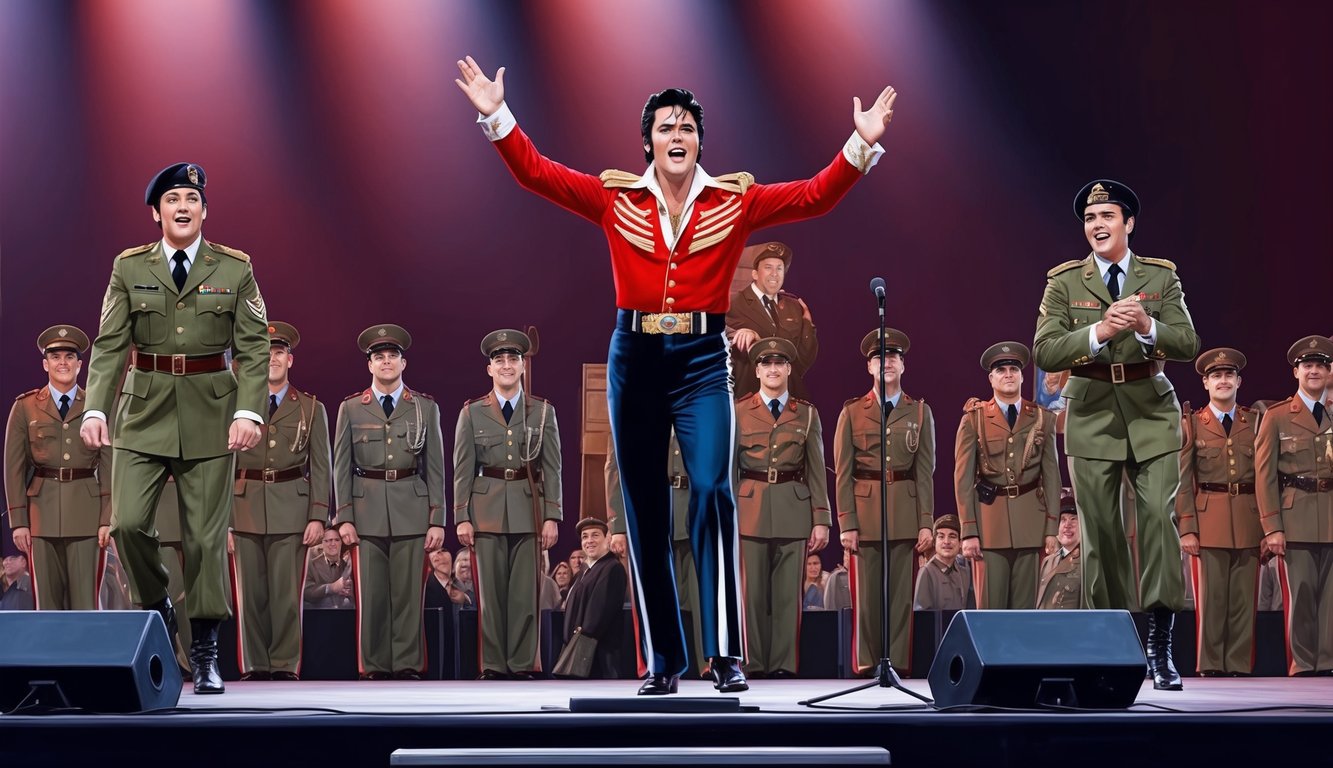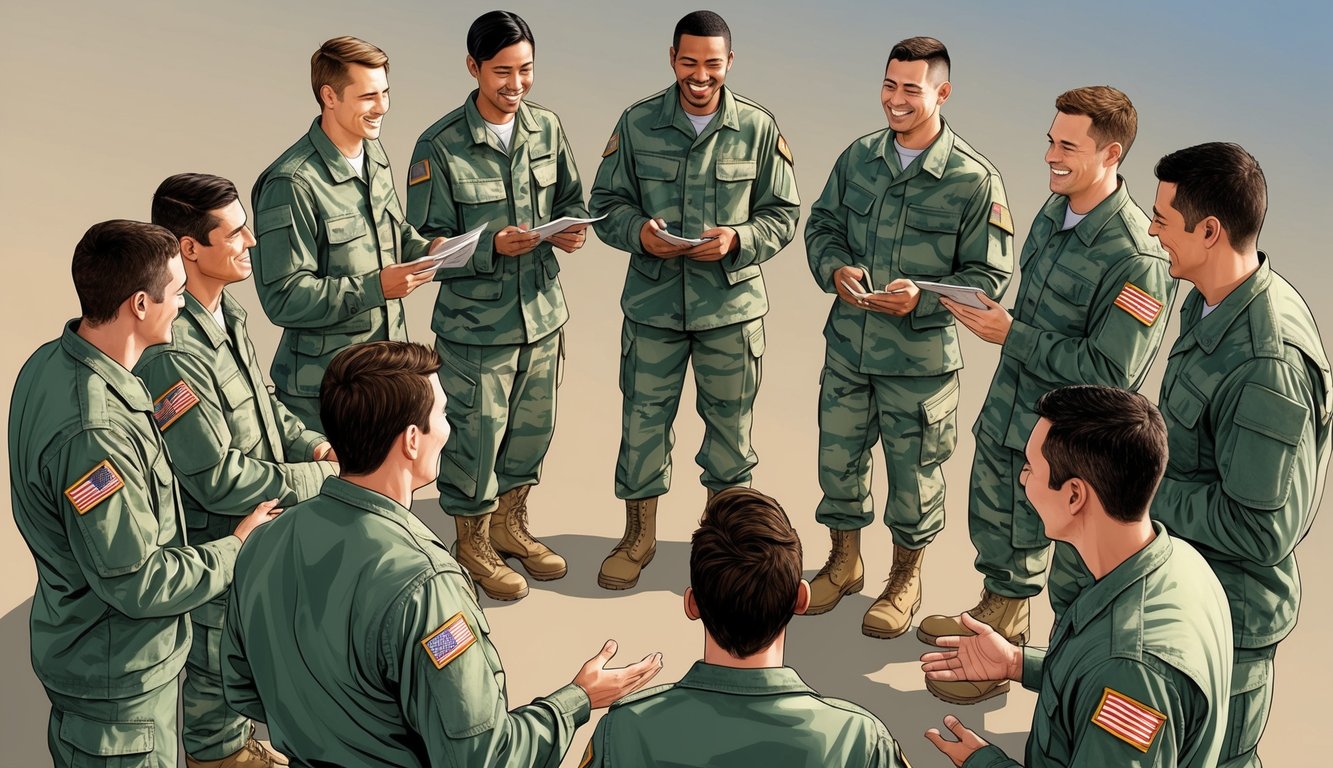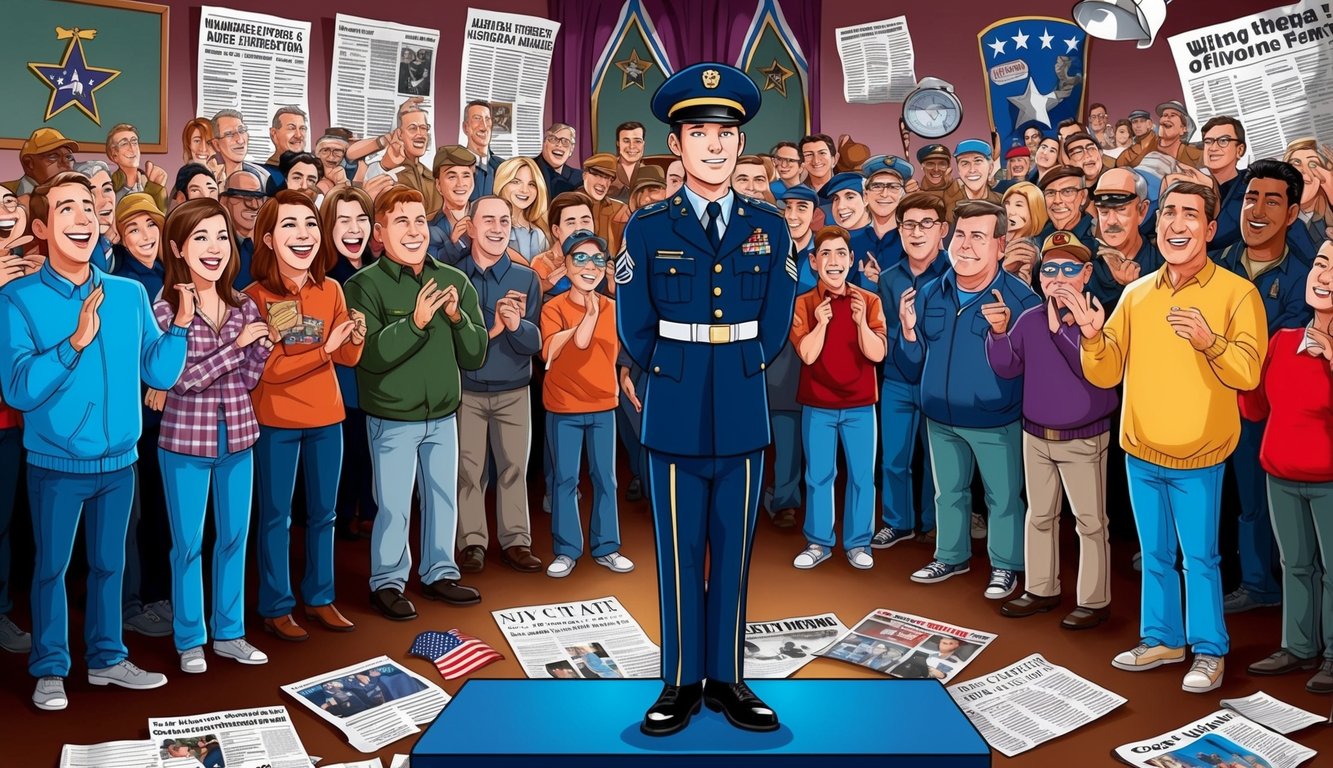Elvis Presley’s military service represents a captivating segment of the King of Rock ‘n’ Roll’s life.
While many believe they know everything about this music icon, his experience in the U.S. Army unveils some unexpected insights. In spite of his global fame and wealth, Elvis chose the path of a regular soldier, turning down special privileges and fully embracing the responsibilities of an ordinary GI.
Throughout his two-year service from 1958 to 1960, Elvis underwent a significant transformation.
He replaced his signature pompadour with a military buzz cut and exchanged his flashy performance attire for standard-issue fatigues.
This time spent in Germany not only influenced Elvis’s personal development but also left a lasting mark on his career and personal life.
Prepare to be surprised by how Elvis’s military experience shaped his music, relationships, and public persona.
From forging lifelong friendships to finding new musical inspirations, his Army days were anything but a hindrance to his career.
This period is a testament to Elvis’s character and his resolve to serve his country, even at the pinnacle of his success.
Key Takeaways
- Elvis served as an ordinary soldier, rejecting special treatment despite his celebrity status
- His military tenure in Germany greatly influenced his personal life and professional trajectory
- Elvis’s service in the Army had a profound effect on his music and public image when he returned to civilian life
Before the Army: Elvis’s Rise to Fame

Elvis Presley’s ascent to fame was a whirlwind of talent, charisma, and groundbreaking music.
Get ready to learn how he transformed from a small-town youth to the King of Rock and Roll in just a matter of years.
Early Music Career and National Acclaim
What you might not realize is that Elvis’s career began with a simple gift to his mother.
In 1953, he recorded “My Happiness” at Sun Studio, which caught the attention of Sam Phillips, who recognized the young singer’s potential.
By 1954, Elvis was creating a stir with his unique fusion of country, blues, and rock ‘n’ roll.
His vibrant performances and striking looks rapidly gained him popularity.
The speed of his rise to fame will astound you.
In 1956, Elvis became a sensation on national television shows like Ed Sullivan, captivating audiences with his electrifying hip movements.
Suddenly, everyone was enamored with the Elvis phenomenon.
His records flew off the shelves, and teenagers throughout America were captivated by the emerging rock star.
Top Hits: From Heartbreak Hotel to Jailhouse Rock
Elvis’s chart-topping success commenced with “Heartbreak Hotel” in 1956.
This haunting track marked his first #1 hit, paving the way for an impressive streak of triumph.
You couldn’t change the station without hearing his magnetic voice.
Here are some of Elvis’s major hits before enlisting:
- “Hound Dog”
- “Don’t Be Cruel”
- “Love Me Tender”
- “All Shook Up”
- “Jailhouse Rock”
These songs did more than top the charts; they revolutionized popular music.
Elvis’s distinctive voice and style inspired countless artists who followed in his footsteps.
The echoes of these timeless classics continue to resonate today.
King Creole: The Last Film Before Enlistment
As Elvis’s music career flourished, Hollywood beckoned.
You might be surprised to find out that he starred in four films before joining the Army.
His on-screen debut was in “Love Me Tender” (1956), followed by “Loving You” and “Jailhouse Rock” in 1957.
Elvis’s final film prior to military service was “King Creole” (1958).
Many regard this as his finest acting performance.
Directed by Michael Curtiz, known for “Casablanca,” the film showcased Elvis’s acting abilities alongside his musical talent.
Filming concluded just weeks before Elvis was to report for duty, creating a bittersweet moment for the superstar as he transitioned from one significant chapter of his life to another.
You can picture the mix of excitement and uncertainty he felt as he prepared to exchange his guitar for a uniform.
The Draft and Enlistment
Elvis Presley’s military journey began with his draft notice in 1957.
His choice to serve as a regular soldier took many by surprise, marking the start of his Army experience at Fort Hood and Fort Chaffee.
Receiving the Draft Notice and Public Reaction
On December 20, 1957, Elvis received his draft notice from the Memphis Draft Board.
Just imagine the shockwaves this sent through the entertainment world.
Fans were distraught, and media coverage exploded.
The United States appeared to be losing its biggest star to military duty.
Anticipating this moment, Elvis’s manager, Colonel Tom Parker, worked tirelessly to manage the public’s reaction and ensure that Elvis’s career would remain intact.
Despite the frenzy, Elvis maintained composure and accepted his obligation.
Making the Decision to Serve as a Regular Soldier
You might expect someone of Elvis’s caliber to seek special treatment, but he defied expectations.
He opted to serve as a regular soldier, declining opportunities to join Special Services.
This choice earned him admiration from both fans and his fellow soldiers.
Elvis famously proclaimed, “The Army can do anything it wants with me.” This humble mindset resonated with many Americans who appreciated his dedication to civic duty.
His readiness to serve as a typical draftee showcased a side of Elvis that many had yet to witness.
Training Days: From Fort Hood to Fort Chaffee
Elvis’s military experience began at Fort Chaffee, Arkansas, where he was inducted on March 24, 1958.
You may have seen the iconic images of Elvis receiving his military haircut in that setting.
It marked a pivotal moment, symbolizing his change from rock star to soldier.
Following induction, he transferred to Fort Hood, Texas, for basic training.
He immersed himself in Army life, confronting the physical and mental challenges of boot camp.
Fellow recruits noticed his commitment and eagerness to fit in.
During this period, Elvis faced personal loss with the passing of his mother.
Nevertheless, he persevered through his training, demonstrating his resilience and determination in fulfilling his military duty.
Stationed in Germany: A New Chapter
Elvis Presley’s military service took an intriguing turn when he was assigned to Germany in 1958.
This overseas duty would provide experiences and skills that he hadn’t anticipated.
Transition to Active Duty and Assignment in Friedberg
You might find it surprising that Elvis arrived in Bremerhaven, Germany, on October 1, 1958.
At just 23, it marked his first journey outside North America.
He was assigned to Ray Barracks in Friedberg, joining the 3rd Armored Division, known as “Hell on Wheels.”
As a member of Company D, 32nd Tank Battalion, Elvis embraced his role.
He adapted swiftly to the demands of active duty, impressing superiors with his dedication and strong work ethic.
The structure and discipline of military life starkly contrasted with his previous life as a rock ‘n’ roll star.
Special Services Offer and Instead Choosing Tank Training
While the Army offered Elvis a comfortable position in Special Services where he could entertain fellow soldiers, he astounded everyone by declining.
Instead, Elvis opted to undergo rigorous tank training, affirming his dedication to being treated as any other serviceman.
He immersed himself in mastering the operation of an M48 Patton tank, developing his skills in marksmanship and field training, proving he was more than just a handsome face with a remarkable voice.
Elvis’s time in Germany wasn’t solely focused on duty; he still managed to engage with fans and even met his future wife, Priscilla, during this time.
The experiences in Friedberg left a lasting impression on both his personal life and career in music.
Elvis’s Military Life and Personal Developments
Elvis’s tenure in the Army brought about significant changes and growth.
You’ll discover insights into his daily routine, new relationships, and the skills he developed during his service.
Daily Life as a Soldier and Meeting Priscilla Beaulieu
As Elvis, your day in the Army would begin early with reveille.
You would don your uniform, tidy your bunk, and head to the mess hall for breakfast.
Training drills filled your mornings, followed by afternoons dedicated to maintenance tasks or specialized training.
During time off, you might socialize with fellow soldiers or play guitar in the barracks.
It was at an off-base gathering in Bad Nauheim, Germany, that you first encountered 14-year-old Priscilla Beaulieu.
Despite the age gap, you formed an instant connection.
You invited Priscilla to visit you on base, igniting a romance that would eventually culminate in marriage years later, all while being closely monitored by military officials and her parents.
Skills Honed: From Pistol Sharpshooter to Karate
Your military experience wasn’t solely about following orders.
You uncovered hidden talents and developed new skills that would prove beneficial well beyond your time in service.
You excelled in marksmanship, receiving the Sharpshooter badge with the .45 pistol.
This accomplishment bolstered your confidence and earned the respect of your comrades.
Martial arts piqued your interest, prompting you to begin studying karate.
The discipline and focus required in this practice complemented military training, enhancing your physical fitness and mental acuity.
These newfound skills became integral to your identity, influencing your stage presence and personal endeavors long after your discharge.
The Challenges: Tension, Popularity, and Adaptation
Navigating the balance between fame and life as an ordinary soldier posed its own set of challenges.
You encountered skepticism from some who assumed you would receive special treatment.
To counter this perception, you diligently worked to prove your worth, often volunteering for additional responsibilities.
Your efforts paid off, considering the respect you earned from many fellow soldiers and superiors.
Your celebrity status remained undiminished during your service.
Tons of fan mail flooded in, creating logistical challenges for the Army postal service.
Carefully coordinated public appearances and press events were essential to maintain military decorum.
Initially, adapting to military life’s rigidity proved difficult.
You missed the freedom of civilian life and performing.
However, you gradually came to value the structure and discipline, which would significantly influence your work ethic in your post-military endeavors.
Friendships and Bonds within the Military

Elvis Presley forged enduring friendships during his military service, demonstrating how camaraderie is vital in military life.
Charlie Hodge and Other Companions
Charlie Hodge became one of Elvis’s closest allies during his Army days.
Surprising as it may seem, they first met in basic training at Fort Hood, Texas.
Their friendship flourished beyond their military service, with Hodge later joining Elvis’s entourage.
Elvis also developed strong bonds with other soldiers, helping him maintain a semblance of normalcy amid his fame.
Many of his Army friends described him as approachable and kind-hearted.
Some of Elvis’s military friendships endured well into life.
He often hosted his Army buddies at Graceland and financially supported them in times of need.
The Importance of Camaraderie in the Army
Camaraderie played a crucial role in Elvis’s experience during service.
You can imagine how beneficial it was in helping him adjust to life in the military and cope with the distance from home.
The bonds he formed in the Army provided him with a solid support system.
His fellow soldiers included him as just another GI, which he appreciated.
These friendships imparted important lessons about loyalty and trust.
Elvis frequently reminisced fondly about his military days, crediting them with fostering personal growth.
The Impact of Service on Elvis’s Career

Elvis Presley’s military service had profound implications for his musical journey and public image.
His experiences in the Army helped define both his artistic direction and career path upon returning to civilian life.
Continuing His Art: The G.I. Blues Album and More
Elvis didn’t allow his musical abilities to wane during his time in Germany.
You might be surprised to learn that he recorded “A Big Hunk O’ Love” during a leave in 1958.
This track later climbed to the number one spot on the charts.
After returning to civilian life, he quickly capitalized on his military service.
The 1960 film “G.I. Blues” and its accompanying soundtrack celebrated his experiences in the Army.
This musical film paired Elvis with Nancy Sinatra, merging his rock vibes with a more mature sound.
The “G.I. Blues” album showcased that Elvis could still reign supreme on the charts even after his service.
It maintained the number one position on the Billboard album chart for ten weeks, highlighting the audience’s anticipation for his new music.
Military Discharge and Return to Music and Films
Elvis received an honorable discharge on March 5, 1960.
You might expect him to take a break, but he jumped right back into his career with remarkable energy.
Just weeks post-service, Elvis was back in the recording studio.
He began work on his post-military comeback album, “Elvis Is Back!” This record highlighted a more mature sound, melding rock, blues, and pop influences.
20th Century Fox wasted no time reintegrating Elvis into cinema. “G.I. Blues” marked the start of a series of successful film projects.
You saw Elvis in a refreshing light – a clean-cut, all-American figure appealing to an even broader audience.
His first concert after the Army occurred in Memphis on February 25, 1961.
Fans jubilantly welcomed the King back to the stage, affirming that his time away had not diminished his star power.
After the Army: Elvis’s Legacy
Elvis Presley’s impact extended well beyond his musical career following his military service.
His time in the Army shaped his later endeavors, influencing his philanthropic activities and enduring cultural significance.
Philanthropic Efforts and Charities
The generosity of Elvis became legendary after his military service.
You may be surprised to hear that he frequently gifted cars and jewelry to friends and strangers.
His charitable contributions included support for St. Jude Children’s Research Hospital and the USS Arizona Memorial in Pearl Harbor.
Elvis also organized benefit concerts for various causes.
One significant event was his 1961 concert in Hawaii, raising funds for the USS Arizona Memorial—an expression of his dedication to honoring fellow servicemen.
A Lasting Influence on Music and Culture
Post-Army, Elvis’s influence on music and culture only intensified.
His legacy can be traced through innumerable artists, from The Beatles to contemporary pop stars.
His iconic jumpsuits and dynamic stage presence became synonymous with Las Vegas entertainment.
Graceland, Elvis’s estate, evolved into a pilgrimage destination for fans around the globe.
Today, it operates as a museum, welcoming over 600,000 visitors annually.
Even years after his passing in 1977, Elvis’s legacy continues through his remarkable music, films, and the enduring fascination with his life story.
Following his service, Elvis transitioned from a rebellious rock ‘n’ roll figure to a mainstream entertainer.
This evolution opened the door for a significantly broader audience while solidifying his status as a cultural icon.
Frequently Asked Questions
Elvis Presley’s military service was a pivotal chapter in his life and career.
Here are answers to some common inquiries about the King’s time in the Army.
How did Elvis Presley end up being drafted into the Army?
Elvis qualified for the draft when he celebrated his 21st birthday on January 8, 1956.
Despite his notoriety, he was drafted like any young man his age.
He received his draft notice in December 1957 and was inducted into the U.S. Army on March 24, 1958.
Can you tell me about Elvis’s rank and role during his military service?
Elvis enlisted as a private and completed basic training at Fort Hood, Texas.
He eventually achieved the rank of sergeant and received training as a tank operator while serving in the 3rd Armored Division.
What were the specific tasks or jobs that Elvis was responsible for while in the Army?
As a tank operator, Elvis was accountable for driving and maintaining M48 Patton tanks.
He participated in various field exercises and drills, handling the same responsibilities as his fellow soldiers regardless of his fame.
Do you know how long Elvis served in the military and where he was deployed during that time?
Elvis served for two years, from March 1958 until March 1960.
His initial months were spent at Fort Hood undergoing basic and advanced training.
Later, he was stationed in Germany, where he served with the 3rd Armored Division in Friedberg.
Was there a special reason why Elvis was honorably discharged from the Army?
Elvis was honorably discharged on March 5, 1960, after completing his two-year active duty service.
His discharge was routine, as he fulfilled the requisite time like any other serviceman.
Could you share some unique or lesser-known facts about Elvis’s time in the military?
During his military service, Elvis donated his pay to charity.
He also met his future wife, Priscilla, while stationed in Germany.
His Army experience helped shape his image and broaden his appeal to a larger audience.

